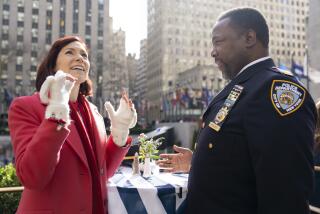‘Law & Order’ and a stiff upper lip
Pitted against edgy procedurals, trendy reality shows or ensemble dramas, NBC’s “Law & Order” for nearly 20 years has persevered as one of TV’s most recognizable and durable brands. And if it lasts a few more seasons, the hybrid cop-and-lawyer series would eclipse “Gunsmoke” as television’s longest-running drama.
But even as the franchise remains a popular draw for viewers -- the so-called mother ship, along with its two satellite series “Law & Order: Criminal Intent” and “Law & Order: Special Victims Unit,” air as many as 90 times a week between first-run episodes and repeats in syndication -- “Law & Order” is facing a new trial across the Atlantic, where it is being judged by a new jury: the British television audience.
Swimming against the flood of recent British imports to American television -- “ The Office,” “ Life on Mars,” “American Idol” and “ Dancing With the Stars,” to name a few -- “Law & Order” becomes the first American drama to be adapted for British television. The remade version of the stalwart crime and punishment series premiered late last month.
Working from scripts already produced for the American show, the British one, with its local cast and crew, has been reworded and reworked to reflect the sensibilities of its new home. With its thick British accents and courtroom wigs, you might call it “My Fair Law & Order.”
“I wanted to demonstrate that no matter what the system of justice is, ‘Law & Order’ works,” said the franchise’s creator, Dick Wolf, during a breakfast at the Beverly Hills Hotel’s Polo Lounge. “The biggest difference is that there’s not as much plea bargaining there as there is here. And the bottom line is our own legal system is based on English common law.”
It’s not the first time that “Law & Order” has been refashioned for a European audience. Two years ago, Wolf expanded the brand to France for “Criminal Intent” and to Russia for both “Criminal Intent” and “Special Victims Unit.” And the Anglicized version of “Law & Order,” co-produced by London-based Kudos Film and Television, Wolf Films and NBC Universal, was green-lighted even though its American inspiration has been broadcast for years on British TV.
“I love it because it feels the same,” said Wolf. “But yet it’s totally different.”
Producers were pleased with the tune-in for the first broadcasts. “Law & Order: U.K.” attracted more than 6.3 million viewers to ITV1 and won its 9 p.m. Monday slot, beating out the popular BBC series “Who Do You Think You Are?” in which celebrities trace their ancestry. The second week declined to 5.8 million viewers.
Brit crits weigh in
Initial critical reaction in Britain to the series was generally positive. Said Matt Baylis of the Daily Express: “Even though it’s not exactly new -- it feels like a breath of fresh air.” And the “We Love Telly” column of the Daily Mirror wrote, “It’s all highly professional and heroic.”
But the Guardian’s Sarah Dempster was less enthusiastic: “There is the original series’ clipped dialogue and caffeinated camera work, but trying to affix the same razzle-dazzle principles to the British crime drama is like trying to fit a rain cloud into a tuxedo. Fiddly. And wrong.”
Much of the U.K. version of the show remains the same -- most notably its format and no-nonsense tone. The first half-hour is the investigation of a crime by two detectives. Then, just as in its American cousin, the focus switches to the legal arena in the second half-hour as prosecuting attorneys tackle the case.
Just as New York serves as a prominent character in the U.S. version, London, with its rich history and picturesque locales, takes on that role in the U.K. program. The series also share the trademark two-tone “ch-chunk” pulse that backs up the black cards announcing a change in location.
“We really wanted to take care of Dick Wolf’s favorite offspring,” said Kudos founder Stephen Garrett, whose creative team culled through 150 episodes to find the best candidates for adaptation. “From the very beginning, we wanted to do things the American way, but also reach out to British audiences. There’s some procedural niceties that just didn’t correspond. But they’re basically the same.”
But still there are inevitable differences, particularly in language and cultural references. Said Wolf: “They are fraternal, not identical twins. There are subtle differences.” Whereas the original version gives personal information about its characters sparingly, the U.K. version delivers slightly more: about eight lines per episode. One detective eats sushi on the go rather than grabbing a snack at a food cart.
“There’s also a different rhythm in the drama,” said Wolf. The British “don’t like the crashing, speedy pace of dramas that we have here. Characters there like to take their time when they talk,” resulting in scripts that are two scenes shorter than the American counterpart.
TV historian Tim Brooks said the flashy sensibilities of American shows usually don’t lend themselves to adaptation for British audiences.
“American shows are much more violent, louder, with more special effects,” said Brooks, who co-wrote “The Complete Directory to Prime Time Network and Cable TV Shows.” “They have flashy sidekicks. They can run there in Britian as curiosities, but their dramas are much more methodical, more about the intricacies. But maybe ‘Law & Order: U.K’ is a portent of things to come.”
Perhaps the most immediate difference to U.S. audiences would be the famous opening pronouncement that precedes the first scene. In the American version, the announcer says, “In the criminal justice system, the people are represented by two separate yet equally important groups: the police, who investigate crime, and the district attorneys, who prosecute the offenders. These are their stories.” But in the British version, it’s the Crown Prosecution Service that prosecutes the offenders.
There and back?
In the world of TV, there’s no end to borrowing, cutting and pasting. If the show proves successful overseas, Wolf hopes the U.K. version can then cross back to America. “I would love ‘Law & Order: U.K’ to run over here,” said Wolf. “I think it would be perfect programming for Saturday night,” referring to the period when most networks, including NBC, program reruns or unscripted programs.
NBC Universal executives appear open to the idea. “It’s definitely something we’re having a conversation about,” said Angela Bromstad, who manages NBC’s studio and network program development. “It is a really great show.”
But Bromstad, who had been running a production unit for the company in London before taking on her current duties last year, also wondered whether American audiences would have trouble grasping the series. “It’s very British,” she said. “It might do much better on BBC America than for us. Still, the show is completely reinvented, and it beautifully showcases London.”
Whether “Law & Order” returns home or not, Wolf is optimistic about tailoring his series for export to a host of other countries. “There could easily be a ‘Law & Order: Istanbul,’ ” he said. “Remember: Murder is still illegal in every country on Earth.”
More to Read
The biggest entertainment stories
Get our big stories about Hollywood, film, television, music, arts, culture and more right in your inbox as soon as they publish.
You may occasionally receive promotional content from the Los Angeles Times.







